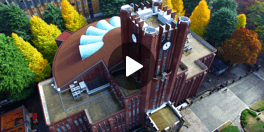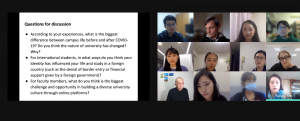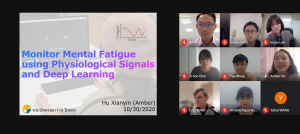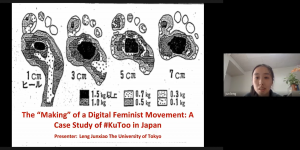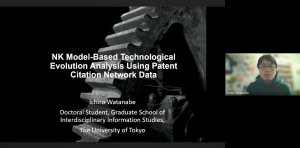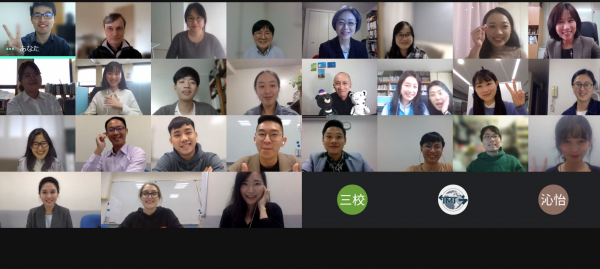
November 25, 2020
2020日韓台シンポジウム「Media, Communications, and Information in an Era of Global Crisis」The UT-SNU-NCCU Symposium 2020 “Media, Communications, and Information in an Era of Global Crisis”
毎年秋に行われる日韓台共同シンポジウムが今年も10月30日に開かれました。東京大学大学院情報学環・学際情報学府、ソウル大学校社会科学大学言論情報学科、国立政治大学伝播学院が共催するこの国際シンポジウムは、今年は東大が韓国と台湾の教員及び学生を東京に招いて開催する予定でしたが、新型コロナウイルス感染症(COVID-19)の感染拡大の影響を受け、半日間のオンラインシンポジウムとして開催されました。
「Media, Communications, and Information in an Era of Global Crisis」というタイトルを掲げた今年のシンポジウムは、前半には各大学の学生参加者による研究発表の場を、後半には3か国におけるCOVID-19の影響及び各国の対応などを社会、文化、政治、そしてメディアといった様々な側面から議論する場を設けました。各大学から教員と学生を合わせて34名が参加し、オンラインによる制限をものともせず熱い議論をかわす時間になりました。
前半の学生研究発表セッションは「身体とパンデミック」「メディア・ジャーナリズムとジェンダー」そして「空間・テクノロジー・政策」という3つのセッションに分かれて行われました。各セッションでは様々なメディアにおける最新の現状を分析した研究はもちろん、スペクタクルとしての都市空間やディープラーニング使用経験を分析した研究など、幅広い分野やテーマにわたる様々な研究が報告されました。
後半のプレナリーセッションでは、各大学の学生チームによる報告後、参加者全体による議論を行いました。東京大学チームは大学におけるCOVID-19の感染拡大による影響について、特に知識生産・共有、新しいコミュニケーションツールの活用、そして留学生への影響といった面に焦点を当てて報告しました。次にソウル大学チームは今年8月15日に韓国で行われた大規模デモをめぐって拡散されたCOVID-19関連フェイクニュースについて、そして最後には国立政治大学チームがCOVID-19の感染拡大を政治家が政治的アジェンダとして使う状況を数か国の事例を通して報告しました。全体討論ではそれぞれの異なる現況や観点を参照しつつ、共通の悩みやその打開策を一緒に模索する貴重な議論になったと思います。
記事:イミンジュ(特任助教)
英文校正:デイビッド・ビュースト(特別専門員)
参加学生からのコメント:
渡部一郎(博士課程)
日韓台シンポジウムは、参加者の国籍も専門も多様でした。そのような会議でいかに自分の研究を面白く聞かせるかということを意識して発表を行う経験は新鮮で、研究者として良い経験になったと感じています。全体セッションでは台湾・韓国の社会で生きる学生たちがコロナ禍を通してどのようなことを感じ、どのような困難に直面しているかを聞くことができました。人々の行き来が制限された現状でこのような生の声を聞くことができたことも、シンポジウムの収穫と言えると思います。貴重な機会を得られたことを感謝いたします。
The UT-SNU-NCCU Symposium, entitled “Media, Communications, and Information in an Era of Global Crisis,” took place on October 30th, 2020. This is a yearly event held every autumn co-hosted by three universities: the Graduate School of Interdisciplinary Information Studies at the University of Tokyo (UT), the Department of Communication at Seoul National University (SNU), and The College of Communication at National Chengchi University (NCCU). In the past, one of the three universities has invited faculty members and students from the other two universities to its own campus for the symposium, but this year’s symposium was replaced by an online gathering due to the COVID-19 pandemic. A total of 38 participants from the three universities took part in the symposium enthusiastically sharing their ideas on research and experiences under the pandemic.
This year’s symposium consisted of two main parts: student presentation sessions after the opening remarks delivered by Professor Noboru Koshizuka, Dean of the GSII, and a plenary session followed by the ending remarks made by Professor Shin Mizukoshi. The student presentation sessions in the former part included three sub-sessions titled respectively “Body and Pandemic”, “Media, Journalism and Gender”, and “Space, Technology and Policy.”
The subsequent plenary session discussed various responses to the ongoing COVID-19 pandemic along with other destabilizing factors in the current situation. Questions and general discussions were introduced by brief presentations given by teams of students from each university. The UT team shared the current situation of the university under COVID-19, especially focusing on knowledge production and transfer, new communication tools used in the university, and international students’ lives under the pandemic. The presentation given by the SNU team covered the recent diffusion of fake news on health related to the pandemic by introducing the case of the 8.15 rally in South Korea. Lastly, the NCCU team presented how political figures in various countries have associated their political agenda with the outbreak and spread of COVID-19 to gain hegemony.
Text: LEE Minjoo (Project Assistant professor)
Proofreading: David Buist (Project senior specialist)
Comments from the participants:
ZHAO Xinshu (PhD student)
I really appreciate this opportunity to present my research in front of fellow graduate students and faculty members from three universities. Prof. Buist, our instructor for the class International Conference Presentation, is very resourceful, amiable, and trustworthy so that I could communicate my insecurities with him and find a solution together. Although a veteran teacher myself, attending the class and the ensuing symposium allowed me to confront my weaknesses in articulating and conveying ideas effectively to an academic audience. I have also benefited from the teamwork that was required as part of the plenary session, through which I befriended graduate students working on very diverse research projects from tourism policy to artificial intelligence. It was definitely a rewarding experience.
This year’s symposium was different from previous ones in that everything was moved online like most academic conferences currently held worldwide. As an old saying goes, “Never let a crisis go to waste.” Although the thrill of global travel and sampling of local culture were rendered quite impossible at this time, we nevertheless found ourselves thinking and responding to each other’s concerns under the pandemic. It is during this trying time that communication, partnership, and educational entrepreneurship are especially needed – everything that the annual UT-SNU-NCCU symposium represents.
Ichiro Watanabe (PhD Student)
The UT-SNU-NCCU symposium was rich in diversity of participants’ nationalities and research fields. As a researcher, it was a fresh experience for me to give a presentation in such a forum keeping in mind how to make my research interesting to the audience. In the plenary session, I could hear from students from Taiwan and South Korea about how they are feeling and what difficulties they are facing during the COVID-19 pandemic. In the current situation where people’s access to each other has been restricted, we could hear each other’s real voices, which was a great benefit of the symposium. Thank you very much for this valuable opportunity.
LENG Junxiao (PhD student)
The 2020 UT-SNU-NCCU web symposium was a very enjoyable academic event. In fact, it was my first time to participate in an English academic conference and played multiple roles as independent presenter, co-presenter and student commentator. The experience was amazing; not only did I gain valuable suggestions on my own research from a broad audience, but very much enjoyed working with my fellow students and Professor David Buist in preparation for the plenary session. I also felt surprised and excited to meet students and faculty members from diverse backgrounds, which exposed me to some interesting fields of knowledge and ideas I was not familiar with. Last but not the least, despite the COVID-19 situation, the web symposium went on very smoothly thanks to the great efforts paid by the technical personnel, who enabled this vibrant and inspiring connective event.

